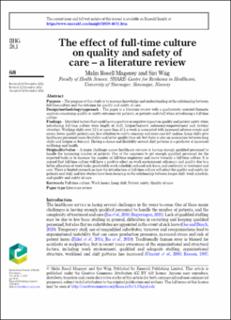| dc.contributor.author | Magerøy, Malin Emilia Rosell | |
| dc.contributor.author | Wiig, Siri | |
| dc.date.accessioned | 2023-06-27T11:26:04Z | |
| dc.date.available | 2023-06-27T11:26:04Z | |
| dc.date.created | 2022-12-14T23:17:43Z | |
| dc.date.issued | 2023 | |
| dc.identifier.citation | Magerøy, M. R., & Wiig, S. (2023). The effect of full-time culture on quality and safety of care–a literature review. International Journal of Health Governance, 28(1), 68-81. | en_US |
| dc.identifier.issn | 2059-4631 | |
| dc.identifier.uri | https://hdl.handle.net/11250/3073470 | |
| dc.description.abstract | Purpose
The purpose of this study is to increase knowledge and understanding of the relationship between full-time-culture and the outcome for quality and safety of care.
Design/methodology/approach
The paper is a literature review with a qualitatively oriented thematic analysis concerning quality or safety outcomes for patients, or patients and staff when introducing a full-time culture.
Findings
Identified factors that could have a positive or negative impact on quality and patient safety when introducing full-time culture were length of shift, fatigue/burnout, autonomy/empowerment and system/structure. Working shifts over 12 h or more than 40 h a week is associated with increased adverse events and errors, lower quality patient care, less attention to safety concerns and more care left undone. Long shifts give healthcare personnel more flexibility and better quality-time off, but there is also an association between long shifts and fatigue or burnout. Having a choice and flexibility around shift patterns is a predictor of increased wellbeing and health.
Originality/value
A major challenge across healthcare services is having enough qualified personnel to handle the increasing number of patients. One of the measures to get enough qualified personnel for the expected tasks is to increase the number of full-time employees and move towards a full-time culture. It is argued that full-time culture will have a positive effect on work environment, efficiency and quality due to a better allocation of work tasks, predictable work schedule, reduced sick leave, and continuity in treatment and care. There is limited research on how the introduction of full-time culture will affect the quality and safety for patients and staff, and few studies have been focusing on the relationship between longer shift, work schedule, and quality and safety of care. | en_US |
| dc.language.iso | eng | en_US |
| dc.publisher | Emerald | en_US |
| dc.rights | Navngivelse 4.0 Internasjonal | * |
| dc.rights.uri | http://creativecommons.org/licenses/by/4.0/deed.no | * |
| dc.title | The effect of full-time culture on quality and safety of care – a literature review | en_US |
| dc.title.alternative | The effect of full-time culture on quality and safety of care – a literature review | en_US |
| dc.type | Peer reviewed | en_US |
| dc.type | Journal article | en_US |
| dc.description.version | publishedVersion | en_US |
| dc.rights.holder | The authors | en_US |
| dc.subject.nsi | VDP::Samfunnsvitenskap: 200 | en_US |
| dc.subject.nsi | VDP::Medisinske Fag: 700 | en_US |
| dc.source.pagenumber | 68-81 | en_US |
| dc.source.volume | 28 | en_US |
| dc.source.journal | International Journal of Health Governance | en_US |
| dc.source.issue | 1 | en_US |
| dc.identifier.doi | 10.1108/IJHG-11-2022-0106 | |
| dc.identifier.cristin | 2093435 | |
| dc.relation.project | SHARE - Centre for Resilience in Healthcare: 5091 | en_US |
| dc.relation.project | Norges forskningsråd: 275367 | en_US |
| cristin.ispublished | true | |
| cristin.fulltext | original | |
| cristin.qualitycode | 1 | |

